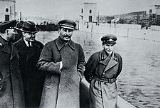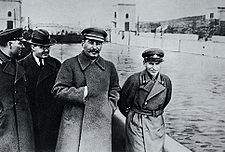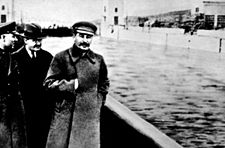
Censorship in the Soviet Union
Encyclopedia
Censorship in the Soviet Union
was pervasive and strictly enforced.
Censorship was performed in two main directions:
Soviet government implemented mass destruction of pre-revolutionary and foreign books and journals from libraries. Only "special collections" (spetskhran
), accessible by special permit from the KGB
, contained old and politically incorrect
material.
Soviet books and journals were also removed from libraries according to changes of Soviet history. Often Soviet citizens preferred to destroy politically incorrect publications and photos, because those connected to it were frequently persecuted.
After the arrest of Lavrentiy Beria
all subscribers of the second edition of the Great Soviet Encyclopedia
obtained a page to replace the one with Lavrentiy Beria article, instead containing Vitus Bering
articles.
's History of the Second World War pre-war purges of Red Army officers, secret protocol to the Molotov-Ribbentrop Pact
, many details of the Winter War
, occupation of Baltic states, Soviet occupation of Bessarabia and Northern Bukovina, Allied assistance to the Soviet Union during the war, many other Western Allies' efforts, the Soviet leadership's mistakes and failures, criticism of the Soviet Union and other content were censored out.
, Television in the Soviet Union
, Radio in the Soviet Union
.
All media in the Soviet Union were controlled by the state including television and radio broadcasting, newspaper, magazine and book publishing. This was achieved by state ownership of all production facilities, thus making all those employed in media state employees. This extended to the fine arts including the theater, opera and ballet. Art and music was controlled by ownership of distribution and performance venues.
Censorship was backed in cases where performances did not meet with the favor of the Soviet leadership with newspaper campaigns against offending material and sanctions applied though party controlled professional organizations.
In the case of book publishing a manuscript had to pass censorship and the decision of a state owned publishing house to publish and distribute the book. Books which met with official favor, for example, the collected speeches of Leonid Brezhnev
were printed in vast quantities while less favored literary material might be published in limited numbers and not distributed widely. Popular escapist literature such as the popular best-sellers, mysteries and romances which form the bulk of Western publishing was nearly non-existent.
Possession and use of copying machines was tightly controlled in order to hinder production and distribution of samizdat
, illegal self-published
books and magazines. Possession of even a single samizdat manuscript such as a book by Andrei Sinyavsky
was a serious crime which might involve a visit from the KGB. Another outlet for works which did not find favor with the authorities was publishing abroad.
It was the practice of libraries in the Soviet Union to restrict access to back issues of journals and newspapers more than three years old.
Other Eastern Bloc states:
Soviet Union
The Soviet Union , officially the Union of Soviet Socialist Republics , was a constitutionally socialist state that existed in Eurasia between 1922 and 1991....
was pervasive and strictly enforced.
Censorship was performed in two main directions:
- State secretState SecretState Secret is a 1950 British drama film directed by Sidney Gilliat and starring Douglas Fairbanks Jr., Jack Hawkins, Glynis Johns and Herbert Lom. It was released in the United States under the title The Great Manhunt.-Cast:...
s were handled by Main Administration for Safeguarding State Secrets in the PressMain Administration for Safeguarding State Secrets in the PressGeneral Directorate for the Protection of State Secrets in the Press under the Council of Ministers of the USSR was the official censorship and state secret protection organ in the Soviet Union. The censorship agency was established in 1922 under the name "Main Administration for Literary and...
(also known as Glavlit) was in charge of censoring all publications and broadcasting for state secrets - Censorship, in accordance with the official ideology and politics of the Communist PartyCommunist Party of the Soviet UnionThe Communist Party of the Soviet Union was the only legal, ruling political party in the Soviet Union and one of the largest communist organizations in the world...
was performed by several organizations:- GoskomizdatGoskomizdatGoskomizdat was the State Committee for Publishing in the Soviet Union.It had control over publishing houses, printing plants, book trade and was in charge of the ideological...
censored all printed matter: fiction, poetry, etc. - GoskinoGoskinoGoskino USSR is the abbreviated name for the USSR State Committee for Cinematography in the Soviet Union...
, in charge of cinema - Gosteleradio, in charge of radio and television broadcasting
- The First DepartmentFirst DepartmentThe First Department was in charge of secrecy and political security of the workplace of every enterprise or institution of the Soviet Union that dealt with any kind of technical or scientific information or had printing capabilities .Every branch of the Central Statistical Administration and its...
in many agencies and institutions, such as the State Statistical Committee (GoskomstatGoskomstatGoskomstat was the centralised agency dealing with statistics in the Soviet Union. Goskomstat was created in 1987 to replace the Central Statistical Administration. While maintaining the same basic functions in the collection, analysis, and publicationand distribution of state statistics,...
), was responsible for assuring that state secrets and other sensitive information only reached authorized hands.
- Goskomizdat
Destruction of printed matter
 |
 |
| Nikolai Yezhov Nikolai Yezhov Nikolai Ivanovich Yezhov or Ezhov was a senior figure in the NKVD under Joseph Stalin during the period of the Great Purge. His reign is sometimes known as the "Yezhovshchina" , "the Yezhov era", a term that began to be used during the de-Stalinization campaign of the 1950s... , the man strolling to Joseph Stalin Joseph Stalin Joseph Vissarionovich Stalin was the Premier of the Soviet Union from 6 May 1941 to 5 March 1953. He was among the Bolshevik revolutionaries who brought about the October Revolution and had held the position of first General Secretary of the Communist Party of the Soviet Union's Central Committee... 's left, was executed in 1940. He was edited out from a photo by Soviet censors. Such retouching was a common occurrence during Stalin's reign. |
Soviet government implemented mass destruction of pre-revolutionary and foreign books and journals from libraries. Only "special collections" (spetskhran
Spetskhran
Spetskhran were limited access collections and archival reserves in libraries and archives of the Soviet Union, as part of the system of censorship in the Soviet Union....
), accessible by special permit from the KGB
KGB
The KGB was the commonly used acronym for the . It was the national security agency of the Soviet Union from 1954 until 1991, and was the premier internal security, intelligence, and secret police organization during that time.The State Security Agency of the Republic of Belarus currently uses the...
, contained old and politically incorrect
Political correctness
Political correctness is a term which denotes language, ideas, policies, and behavior seen as seeking to minimize social and institutional offense in occupational, gender, racial, cultural, sexual orientation, certain other religions, beliefs or ideologies, disability, and age-related contexts,...
material.
Soviet books and journals were also removed from libraries according to changes of Soviet history. Often Soviet citizens preferred to destroy politically incorrect publications and photos, because those connected to it were frequently persecuted.
After the arrest of Lavrentiy Beria
Lavrentiy Beria
Lavrentiy Pavlovich Beria was a Georgian Soviet politician and state security administrator, chief of the Soviet security and secret police apparatus under Joseph Stalin during World War II, and Deputy Premier in the postwar years ....
all subscribers of the second edition of the Great Soviet Encyclopedia
Great Soviet Encyclopedia
The Great Soviet Encyclopedia is one of the largest and most comprehensive encyclopedias in Russian and in the world, issued by the Soviet state from 1926 to 1990, and again since 2002 .-Editions:There were three editions...
obtained a page to replace the one with Lavrentiy Beria article, instead containing Vitus Bering
Vitus Bering
Vitus Jonassen Bering Vitus Jonassen Bering Vitus Jonassen Bering (also, less correNavy]], a captain-komandor known among the Russian sailors as Ivan Ivanovich. He is noted for being the first European to discover Alaska and its Aleutian Islands...
articles.
Censorship of images
Repressed persons were routinely removed not only from texts, but also from photos, posters and paintings.Translations
Translations of foreign publications were often produced in a truncated form, accompanied with extensive corrective footnotes. E.g. in the Russian 1976 translation of Basil Liddell HartBasil Liddell Hart
Sir Basil Henry Liddell Hart , usually known before his knighthood as Captain B. H. Liddell Hart, was an English soldier, military historian and leading inter-war theorist.-Life and career:...
's History of the Second World War pre-war purges of Red Army officers, secret protocol to the Molotov-Ribbentrop Pact
Molotov-Ribbentrop Pact
The Molotov–Ribbentrop Pact, named after the Soviet foreign minister Vyacheslav Molotov and the German foreign minister Joachim von Ribbentrop, was an agreement officially titled the Treaty of Non-Aggression between Germany and the Soviet Union and signed in Moscow in the late hours of 23 August 1939...
, many details of the Winter War
Winter War
The Winter War was a military conflict between the Soviet Union and Finland. It began with a Soviet offensive on 30 November 1939 – three months after the start of World War II and the Soviet invasion of Poland – and ended on 13 March 1940 with the Moscow Peace Treaty...
, occupation of Baltic states, Soviet occupation of Bessarabia and Northern Bukovina, Allied assistance to the Soviet Union during the war, many other Western Allies' efforts, the Soviet leadership's mistakes and failures, criticism of the Soviet Union and other content were censored out.
Control over information
Main articles: Printed media in the Soviet UnionPrinted media in the Soviet Union
Printed media in the Soviet Union, i.e., newspapers, magazines and journals, were under strict control of the Communist Party and the Soviet state.-Early Soviet Union:...
, Television in the Soviet Union
Television in the Soviet Union
Television in the Soviet Union was owned by the state and was under its tight control and Soviet censorship.The governing body in the former Soviet Union was "USSR State Committee for Television and Radio Broadcasting or USSR Gosteleradio , which was in charge both of Soviet Central...
, Radio in the Soviet Union
Radio in the Soviet Union
All-Union Radio was the radio broadcasting organisation for the USSR from 1924 until the dissolution of the USSR...
.
All media in the Soviet Union were controlled by the state including television and radio broadcasting, newspaper, magazine and book publishing. This was achieved by state ownership of all production facilities, thus making all those employed in media state employees. This extended to the fine arts including the theater, opera and ballet. Art and music was controlled by ownership of distribution and performance venues.
Censorship was backed in cases where performances did not meet with the favor of the Soviet leadership with newspaper campaigns against offending material and sanctions applied though party controlled professional organizations.
In the case of book publishing a manuscript had to pass censorship and the decision of a state owned publishing house to publish and distribute the book. Books which met with official favor, for example, the collected speeches of Leonid Brezhnev
Leonid Brezhnev
Leonid Ilyich Brezhnev – 10 November 1982) was the General Secretary of the Central Committee of the Communist Party of the Soviet Union , presiding over the country from 1964 until his death in 1982. His eighteen-year term as General Secretary was second only to that of Joseph Stalin in...
were printed in vast quantities while less favored literary material might be published in limited numbers and not distributed widely. Popular escapist literature such as the popular best-sellers, mysteries and romances which form the bulk of Western publishing was nearly non-existent.
Possession and use of copying machines was tightly controlled in order to hinder production and distribution of samizdat
Samizdat
Samizdat was a key form of dissident activity across the Soviet bloc in which individuals reproduced censored publications by hand and passed the documents from reader to reader...
, illegal self-published
Self-publishing
Self-publishing is the publication of any book or other media by the author of the work, without the involvement of an established third-party publisher. The author is responsible and in control of entire process including design , formats, price, distribution, marketing & PR...
books and magazines. Possession of even a single samizdat manuscript such as a book by Andrei Sinyavsky
Andrei Sinyavsky
Andrei Donatovich Sinyavsky was a Russian writer, dissident, political prisoner, emigrant, Professor of Sorbonne University, magazine founder and publisher...
was a serious crime which might involve a visit from the KGB. Another outlet for works which did not find favor with the authorities was publishing abroad.
It was the practice of libraries in the Soviet Union to restrict access to back issues of journals and newspapers more than three years old.
See also
- Eastern Bloc information disseminationEastern Bloc information disseminationEastern Bloc information dissemination was controlled directly by each country's Communist party, which controlled the state media, censorship and propaganda organs...
- Socialist RealismSocialist realismSocialist realism is a style of realistic art which was developed in the Soviet Union and became a dominant style in other communist countries. Socialist realism is a teleologically-oriented style having its purpose the furtherance of the goals of socialism and communism...
- First DepartmentFirst DepartmentThe First Department was in charge of secrecy and political security of the workplace of every enterprise or institution of the Soviet Union that dealt with any kind of technical or scientific information or had printing capabilities .Every branch of the Central Statistical Administration and its...
- Propaganda in the Soviet UnionPropaganda in the Soviet UnionCommunist propaganda in the Soviet Union was extensively based on the Marxism-Leninism ideology to promote the Communist Party line. In societies with pervasive censorship, the propaganda was omnipresent and very efficient...
- Drug policy of the Soviet UnionDrug policy of the Soviet UnionThe drug policy of the Soviet Union changed little throughout the existence of the state, other than slowly becoming stricter, although some differences in penalties existed in the different Union Republics...
Other Eastern Bloc states:
- Censorship in East GermanyCensorship in East GermanyAs with many Soviet-allied countries prior to the fall of the Berlin Wall, the government of the former German Democratic Republic applied wide censorship during its existence from 1949 to 1990....
- Censorship in the People's Republic of PolandCensorship in the People's Republic of PolandCensorship in the People's Republic of Poland was primarily performed by the Polish Main Office of Control of Press, Publications and Shows , a governmental institution created in 1946 by the pro-Soviet Provisional Government of National Unity with Stalin's approval and backing, and renamed in 1981...
External links
- Attacks on Intelligentsia: Censorship - from Library of CongressLibrary of CongressThe Library of Congress is the research library of the United States Congress, de facto national library of the United States, and the oldest federal cultural institution in the United States. Located in three buildings in Washington, D.C., it is the largest library in the world by shelf space and...
web site - Censorship in the Soviet Union and its Cultural and Professional Results for Arts and Art Libraries
- Lewis, B. E. (1977). Soviet Taboo. Review of Vtoraya Mirovaya Voina, History of the Second World War by B. Liddel Gart (Russian translation). Soviet Studies 29 (4), 603-606.

